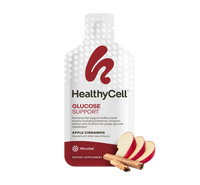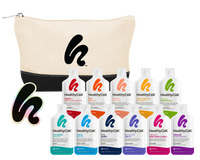Many people have searched endlessly for solutions to conditions like irritable bowel syndrome (IBS) and similar issues like inflammatory bowel disease (IBD) and Crohn's disease. Health supplements, vitamins, and probiotics provide relief to many of those who have serious bowel conditions. Unfortunately, experts have recently identified some supplements and probiotics that can actually aggravate bowel disease symptoms.
In some cases, the culprits are additives that appear in many of these products. In others, it's the delivery method itself. Because of the various ingredients necessary to keep their shape and stability, pills appear to be among the worst ways to ingest supplements or probiotics. Thankfully, there are options for avoiding the dangers of pills while still utilizing an edible form. In this article, we will discuss what additives are dangerous for people with bowel conditions, dive into what delivery methods are safest and suggest the best probiotics and supplements for IBS.
Top Probiotic Supplements and Vitamins To Take For Digestive Health
Probiotics
In recent years, the role of gut microbial diversity as an indicator for human health has become more and more clear. The connections between the gut microbiome and bowel conditions are even more defined. Probiotics are live microorganisms that strengthen this microbiome, as well as provide other effects like helping digest food, destroying cells responsible for disease, and producing vitamins [1]. Thanks to these effects, a growing number of people are turning to probiotics for IBD.
Though you can get some probiotics from sources like yogurt and other fermented foods, it's often far easier to use a high-quality probiotic supplement. Ongoing research has found that some of the most common probiotics, such as Lactobacillus and Bifidobacterium, can effectively treat IBD conditions. Some studies even indicate that it is possible to replace medical therapy with probiotic supplementation in certain cases [2].
Beyond IBD, evidence also shows that you can effectively rely on probiotics for IBS symptoms, as well. In a meta-analysis of dozens of high-quality studies and around 1800 patients, researchers discovered that probiotics dramatically reduced pain and symptom severity scores in participants with IBS [3]. If you’re looking for a quality probiotic that delivers live probiotics, try Bio-K + Drinkable Probiotics for Women & Men that contains 50 billion good bacteria and is dairy-free.
Vitamin D
Vitamin D is integral for maintaining healthy bones and regulating many of the body's cellular functions, including immune health, muscle function, and brain cell activity. Interestingly, a growing body of research has linked vitamin D to various bowel conditions. Experts believe that vitamin D is one of the best vitamins for IBD, largely due to its anti-inflammatory properties. Not only do people with IBS tend to have lower vitamin D levels, but they also respond positively to vitamin D supplements.
Some studies have attributed these beneficial effects to vitamin D's ability to stimulate the immune system and prevent dangerous cell growth, though its anti-inflammatory properties are likely the most important in terms of managing bowel conditions [4]. As the name implies, inflammation plays a signature role in IBD as both a potential cause and as a factor that contributes to worse symptoms. Some experts even suggest replacing other treatments like glucocorticoids with vitamin D because of its preventative and therapeutic effects and general lack of side effects [5].
In a randomized controlled trial, researchers compared the effects of bi-weekly vitamin D supplementation over six months to a placebo. At the end of the study, participants reported significant improvements in their IBS symptoms [6].
How Pill Supplements Aggravate Gut Lining
The dramatic increase in gut disorders along with the rise of processed foods have led to many experts researching the connection between gut health and food additives. While many GI tract supplements claim to fight IBS, IBD, or Crohn's symptoms, they may actually be aggravating these conditions. Pills contain certain additives like food dyes and synthetic ingredients that negatively interact with stomach acid and the gut's microbiome, triggering symptomatic flare-ups [7].
Artificial Dyes
Additives like artificial dyes and colors, as well as color stabilizers, often appear in supplements for IBD and other bowel conditions. Though many people view these compounds as harmless, they actually pose a significant health risk despite providing no benefit beyond appearance. Artificial dyes may increase the risk of certain cancers, allergies, and some autoimmune disorders [8].
In the context of bowel conditions, artificial colorations can cause stomach pain and cramps which then trigger more symptoms of IBS, IBD, and Crohn's disease. In extreme cases, these dyes can cause vomiting, diarrhea, and GI tract swelling. Some people are particularly sensitive to specific colors, such as tartrazine, Red 40, and Yellow 5, and may experience symptoms of a severe allergic reaction [9].
While FDA tests confirm that these additives contain harmful compounds, they supposedly fall within the limits that the FDA feels are safe. However, a report from the Center for Science in the Public Interest (CSPI) shows that the FDA tests of food dyes are flawed. In reality, the FDA purity tests cannot properly detect the total level of these compounds, and studies have found a hundred times the reported level of these chemicals in the colon [10].
Despite the potential health risk these artificial colors pose, they still appear in a range of products, including many supplements for IBD. Given the inherent risk of consuming these dyes, it's best to avoid any GI tract supplements that contain artificial colors and dyes.
Synthetic Ingredients
Being synthetic doesn't necessarily mean an additive is dangerous. Supplements for IBS and similar issues often contain a range of synthetic ingredients. Some of these additives are binding glues, fillers, coatings, and anti-caking agents that hold pills together, while others are artificial sweeteners or flavors that make them more palatable. Unfortunately, many of these additives lack testing and have serious side effects.
Research suggests that some artificial sweeteners, such as aspartame and acesulfame, lower gut bacteria diversity and lead to digestive issues [11]. Interfering with the gut microbiome may not only increase the likelihood of IBD flare-ups but also raise the risk of developing these conditions in the first place.
Microparticles
Recent research has discovered that bacterial-sized microparticles tend to accumulate in the macrophages of lymphoid tissue where Crohn's disease lesions develop. Because macrophages play such an important role in the immune response, experts believe that these microparticles could be responsible for many bowel condition symptoms. Some of the microparticles are contaminants like soil and dirt while others are small portions of additives like food dyes and anti-caking agents [12].
In a double-blind randomized study, researchers found that a diet low in potential microparticles appeared to alleviate the symptoms of Crohn's disease. Other research efforts have uncovered potential mechanisms that explain why microparticles worsen the symptoms of Crohn's disease and other conditions. Microparticles appear to significantly alter endothelial and vascular function, meaning they tend to constrict the blood vessels and limit how much oxygen the tissues receive [13.] One study suggests that the microparticles can act as adjuvants in the presence of antigens, aggravating the ongoing inflammatory response [14]. This essentially means that the body's attempts to fight invading bacteria or similar foreign substances could worsen the symptoms of various bowel conditions.
Because many of these microparticles come from artificial additives and ingredients, the best supplements for digestive problems lack potentially harmful synthetic additives. Additionally, pills usually include a host of synthetic ingredients to remain stable, so most people should choose other delivery methods for their supplements and vitamins for IBS and similar conditions.
You May Also Like: 4 Harmful Ingredients Hiding In Your Vitamins
Try Microgel™ Supplements Instead
If pills can worsen bowel condition symptoms, what can a person do? We understand the risks that pills can present and experts at Healthycell have created an innovative but surprisingly simple solution: MICROGEL™ technology in gel supplements.
MICROGEL™ Technology: What is it?
The simplest explanation of MICROGEL™ is a new delivery method that replaces tablets, capsules, and powders. Developed by world-leading nutritional scientists, this gel releases safe, gentle, soluble (non-hard-particle) nutrients in the GI tract for maximum absorption without aggravation of the gut lining.
These ingestible gels don't use any binding glues, fillers, coatings, or anti-caking agents that other supplements often list as "other ingredients." In fact, it contains gut healthy “other ingredients” such as soluble fiber, beta glucan and citrus pectin. The convenience offers real value too – you would need to take five or more traditional pills to get the same amount of nutrients in one gel pack.
Bioactive Multi
This multivitamin is one of our best options for people with bowel conditions like IBD, IBS, or Crohn's. Not only does Healthycell Bioactive Multi contain a complete spectrum of essential vitamins and minerals, but it also provides additional phytonutrients and antioxidants. Of course, this includes vital nutrients for bowel conditions, like vitamin D. Additionally, it utilizes MICROGEL™ technology and naturally occurring sugars with no synthetic dyes or sweeteners. This ensures that it will not irritate your stomach or aggravate bowel condition symptoms.
Vegan Essentials
If you follow a plant-based diet, Healthycell Vegan Essentials is the perfect vegan supplement choice. This one-a-day multivitamin provides every nutrient you need or might be missing while following a plant-based diet, along with those you need to fight IBD, IBS, or Crohn's disease.† All the ingredients are cruelty-free and contain only sustainably-sourced ingredients.
If you’re looking for the best supplements to take with IBS, try Healthycell MICROGEL™ vitamins. Consult your physician if you’re taking medication for IBS, IBD or Crohn's Disease to discuss benefits or concerns prior to supplementation with a multivitamin.
Keep Reading:
Pros & Cons of Liquid Vitamins for Adults
Alternatives to Swallowing Pills
†This statement has not been evaluated by the Food and Drug Administration. This product is not intended to diagnose, treat, cure, or prevent any disease.
References
- https://www.nccih.nih.gov/health/probiotics-what-you-need-to-know
- https://pubmed.ncbi.nlm.nih.gov/29804478/
- https://pubmed.ncbi.nlm.nih.gov/25780308/
- https://onlinelibrary.wiley.com/doi/full/10.1111/apt.12188#apt12188-bib-0004
- https://pubmed.ncbi.nlm.nih.gov/24754474/
- https://pubmed.ncbi.nlm.nih.gov/27154424/
- https://www.gastrojournal.org/article/S0016-5085(16)35281-7/fulltext
- https://www.ncbi.nlm.nih.gov/pmc/articles/PMC6899614/
- https://www.cspinet.org/new/201006291.html
- https://cspinet.org/resource/summary-studies-food-dyes
- https://www.ncbi.nlm.nih.gov/pmc/articles/PMC7730902/
- https://www.cambridge.org/core/journals/proceedings-of-the-nutrition-society/article/fine-and-ultrafine-particles-of-the-diet-influence-on-the-mucosal-immune-response-and-association-with-crohns-disease/384689154EC4EB2C26C069B9F6437641#
- https://pubmed.ncbi.nlm.nih.gov/24019899/
- https://pubmed.ncbi.nlm.nih.gov/17878997/




